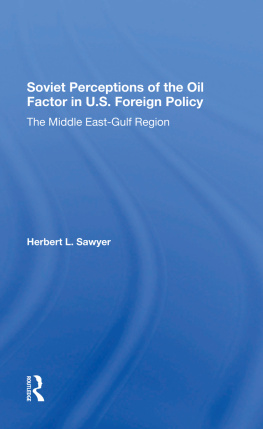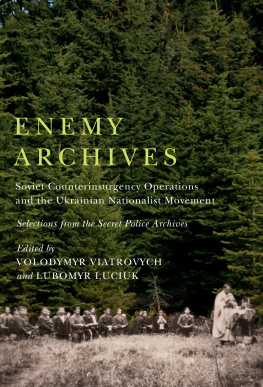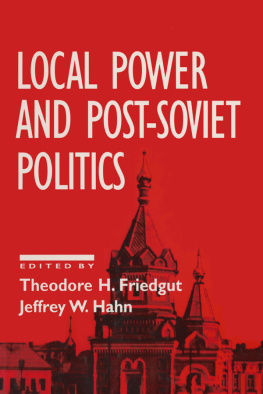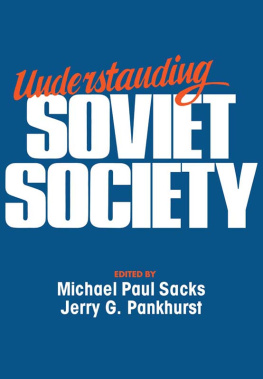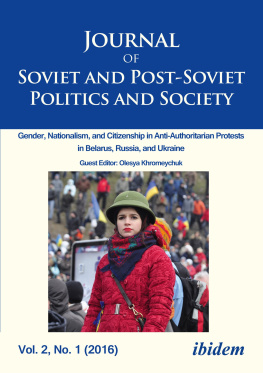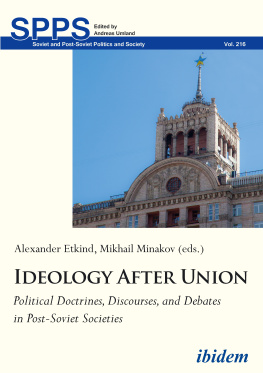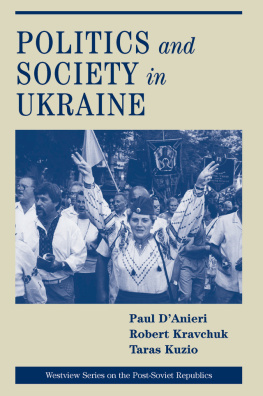The John M. Olin Critical Issues Series
Published in cooperation with the
Harvard University Russian Research Center
The Nationalities Factor in Soviet Politics and Society, edited by Lubomyr Hajda and Mark Beissinger
The Soviet Union in the Third World, edited by Carol R. Saivetz
Soviet Social Problems, edited by T. Anthony Jones, Walter D. Connor, and David E. Powell
First published 1990 by Westview Press
Published 2019 by Routledge
52 Vanderbilt Avenue, New York, NY 10017
2 Park Square, Milton Park, Abingdon, Oxon OX14 4RN
Routledge is an imprint of the Taylor & Francis Group, an informa business
Copyright 1990 by the Harvard University Russian Research Center
All rights reserved. No part of this book may be reprinted or reproduced or utilised in any form or by any electronic, mechanical, or other means, now known or hereafter invented, including photocopying and recording, or in any information storage or retrieval system, without permission in writing from the publishers.
Notice:
Product or corporate names may be trademarks or registered trademarks, and are used only for identification and explanation without intent to infringe.
Library of Congress Cataloging-in-Publication Data
The Nationalities factor in Soviet politics and society/edited by
Lubomyr Hajda and Mark Beissinger.
p. cm.(The John M. Olin critical issues series)
ISBN 0-8133-7689-0. ISBN 0-8133-1067-9 (pbk.).
1. Soviet UnionEthnic relations. 2. NationalismSoviet Union.
3. Soviet UnionPolitics and government1985- . 4. Minorities
Soviet Union. I. Hajda, Lubomyr. II. Beissinger, Mark R.
III. Series.
DK33.N294 1990
305.8'00947dc20
89-70469
CIP
ISBN 13: 978-0-367-29425-0 (hbk)
The editors express their gratitude to the John M. Olin Foundation for its financial assistance and to the Harvard University Russian Research Center for the facilities and staff support that made this project possible. We wish to thank those who contributed their invaluable scholarly advice, including Vernon Aspaturian, Abram Bergson, Steven Blank, Walker Connor, Robert Conquest, Murray Feshbach, Erich Goldhagen, Richard Pipes, and Marc Raeff. We gratefully acknowledge the assistance of Barbara A. Anderson and Brian D. Silver with Soviet demographic data used throughout the volume. Susan Zayer and Karen Taylor-Brovkin provided able administrative help. For skillful technical assistance with the manuscript we are indebted to Jane Prokop, Elizabeth Taylor, and Alison Koff. Catherine Reed, Susan Gardos-Bleich, Christine Porto, and Alex Sich helped generously in diverse ways. Finally, the editors profited at every stage from the congenial working atmosphere and the encouragement of colleagues at the Russian Research Center too numerous to mention. To all of them goes our deep appreciation.
Lubomyr Hajda
Mark Beissinger
CHAPTER 1
The Imperial Legacy and the Soviet Nationalities Problem
Roman Szporluk
What is meant when one speaks about the legacy of Imperial Russia in the nationalities problem of the contemporary Soviet Union?
The most visible legacy of Imperial Russia is the territorial configuration and ethnic composition of the USSR. The resemblance becomes even more striking when one compares the world map of 1913 with that for 1990 and notes the absence from the latter of the colonial empires of Britain, France, Germany, Belgium, the Netherlands, and Portugal, with their vast possessions in Asia and Africa. The contours of Russia then and the USSR now, in the meantime, have hardly changed. Admittedly, neither Helsinki nor Warsaw lies within the USSR, but their loss has been compensated by gains of areas that in 1913 had been known as Galicia, Bukovina, and the Ruthenian counties of Hungary. Then they belonged to the Austro-Hungarian Empire of which no trace remains today.
That the Soviet Union is a multinational state, territorially largely coterminous with the former Russian Empire, does not in itself prove the existence of an "imperial legacy" in Soviet politics, however. More important is the question whether the Soviet Union is just "another name" for the Russian Empire or a fundamentally new kind of polity. To attempt an answer to this question it is essential to identify the specifically political points of similarity and contrast between the two states.
The first and perhaps most important issue concerns the relationship between state and society in the pre- and post-1917 eras. It is the contention of this essay that the nationalities problem is defined by the nature of this fundamental relationship. Thus we need to examine the structure of state-society relations under the Tsars and compare it with that in the Soviet period.
The nature of this relationship between state and civil society will emerge more fully in the course of our discussion. At this point suffice it to say that the autocratic Tsarist state, which in its origins was based on a religious and dynastic legitimization, failed to adjust to the modern political principle of constitutionalism, let alone that of sovereignty of the nation. It also took the state in Russia much longer than elsewhere in Europe to accept the
The second question, in a sense the obverse of the first, concerns the status of Russians in the Tsarist and the Soviet state. How does the Soviet Marxist-Leninist state relate to the Russians as a nation? And, vice versa, how do the Russians, in terms of their national aspirations, relate to the state? The Tsarist Empire ultimately did not succeed in establishing a modus vivendi with the Russian nation as it was represented by the emerging civil society and failed to gain acceptance as a Russian national state. We shall try to determine whether the Soviet state is accepted as "Russian" in a sense in which its imperial predecessor was not.
At this stage, by way of establishing an agenda for discussion, it should be noted that the empire never became a Russian nation-state. Instead, in the words of Ladis K. D. Kristof, it promoted "Rossification," which meant "the development of an unswerving loyalty and direct attachment to the person of the tsar, by God's will the sole power-holder ( samoderzhets ) and head of the Church." The essence of "Rossification" lay in Orthodoxy, not in Russianism. "The Orthodox idea, not the Russian tongue or civilization, was the spiritus movens of the Tsardom. Russia was first of all Holy, not Russian." This explains, for example, why the Tsarist authorities approved the publication of Orthodox texts in Tatar to promote the "Rossification" of the Muslims. In this respect "Rossification" resembles the postrevolutionary policy of Sovietization, with its principle of "national in form, socialist in content."
"Russification," on the other hand, aimed at making the non-Russian subjects of the state Russian in language and identity. This was the goal of Russian nationalists, whatever their other differences. Although, in its last decades especially, Tsarism also promoted "Russification" policies, one may agree with Kristof's notion of a discrepancy or conflict between the "state idea" of the imperial regime and the "national idea" of the Russians. Kristof recognizes that in reality "the difference between the state and national idea is rather subtle, a matter of shades," but he believes that in Russia it became more acute than elsewhere and found reflection in the "dichotomy between narod and gosudarstvo the aims and ideals of 'the people' and 'the state'." Even the language recognized "the distinction between russkii and rossiiskii, between what pertains to the (Great) Russian people and what to All-the-'Russias'." The German, French and Spanish nations had "their" empires, Kristof continues, but the Tsarist Empire was not officially "Russian." Its formal name was Rossiiskaia Imperiia, not Russkaia Imperiia, and the Tsar likewise was not russkii, but vserossiiskii imperator.




